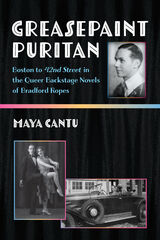300 scholarly books by Brandeis University Press and 12
start with G
300 scholarly books by Brandeis University Press and 12
300 scholarly books by Brandeis University Press
12 start with G start with G
12 start with G start with G
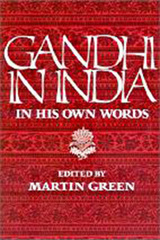
Gandhi in India
In His Own Words
Mahatma Gandhi and Martin Green
Brandeis University Press, 1987
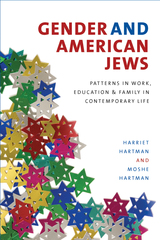
Gender and American Jews
Patterns in Work, Education, and Family in Contemporary Life
Harriet Hartman and Moshe Hartman
Brandeis University Press, 2009
In Gender and American Jews, Harriet Hartman and Moshe Hartman interpret the results of the two most recent National Jewish Population Surveys. Building on their critical work in Gender Equality and American Jews (1996), and drawing on relevant sociological work on gender, religion, and secular achievement, this new book brings their analysis of gendered patterns in contemporary Jewish life right to the present moment. The first part of the book examines the distinctiveness of American Jews in terms of family behavior, labor-force patterns, and educational and occupational attainment. The second investigates the interrelationships between “Jewishness” and religious, economic, and family behavior, including intermarriage. Deploying an engaging assortment of charts and graphs and a rigorous grasp of statistics, the Hartmans provide a multifaceted portrait of a multidimensional population.
[more]
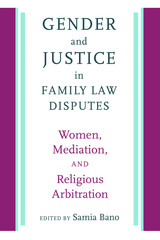
Gender and Justice in Family Law Disputes
Women, Mediation, and Religious Arbitration
Edited by Samia Bano
Brandeis University Press, 2017
Recently, new methods of dispute resolution in matters of family law—such as arbitration, mediation, and conciliation—have created new forms of legal culture that affect minority communities throughout the world. There are now multiple ways of obtaining restitution through nontraditional alternative dispute resolution (ADR) mechanisms. For some, the emergence of ADRs can be understood as part of a broader liberal response to the challenges presented by the settlement of migrant communities in Western liberal democracies. Questions of rights are framed as “multicultural challenges” that give rise to important issues relating to power, authority, agency, and choice. Underpinning these debates are questions about the doctrine and practice of secularism, citizenship, belonging, and identity. Gender and Justice in Family Law Disputes offers insights into how women’s autonomy and personal decision-making capabilities are expressed via multiple formal and nonformal dispute-resolution mechanisms, and as part of their social and legal lived realities. It analyzes the specific ways in which both mediation and religious arbitration take shape in contemporary and comparative family law across jurisdictions. Demarcating lines between contemporary family mediation and new forms of religious arbitration, Bano illuminates the complexities of these processes across multiple national contexts.
[more]
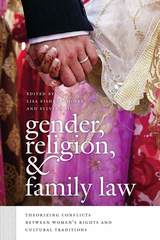
Gender, Religion, and Family Law
Theorizing Conflicts between Women’s Rights and Cultural Traditions
Edited by Lisa Fishbayn Joffe and Sylvia Neil
Brandeis University Press, 2012
In many regions of the world, rights guaranteed under the civil law, including rights to gender equality within marriage and rights in the distribution of family property and child custody upon divorce, are in conflict with the principles of religious law. Women’s rights issues are often at the heart of these tensions, which present pressing challenges for theorists, lawyers, and policymakers. This anthology brings together leading scholars and activists doing innovative work in Jewish law, Muslim law, Christian law, and African customary law. Using examples drawn from a variety of nations and religions, they interrogate the utility of recent theoretical models for engaging with gender and multicultural conflicts, explore contextual differences, and analyze and celebrate stories of successful initiatives that have transformed legal and cultural norms to improve women’s lives.
[more]

Georgia O'Keeffe
A Life
Roxana Robinson
Brandeis University Press, 2020
One of the greatest and most admired artists of the twentieth century, Georgia O’Keeffe led a life rich in intense relationships—with family, friends, and especially with fellow artist Alfred Stieglitz. Her extraordinary accomplishments, such as the often eroticized flowers, bones, stones, skulls, and pelvises she painted with such command, are all the more remarkable when seen in the context of the struggle she waged between the rigorous demands of love and work.
When Roxana Robinson’s definitive biography of O’Keeffe was first published in 1989, it received rave reviews and was named a New York Times Notable Book of the Year. This new edition features a new foreword by the author setting O’Keefe in an artistic context over the last thirty years since the book was first published, as well as previously unpublished letters of the young O’Keeffe to her lover, Arthur MacMahon. It also relates the story of Robinson’s own encounter with the artist. As interest in O’Keeffe continues to grow among museum-goers and scholars alike, this book remains indispensable for understanding her life and art.
When Roxana Robinson’s definitive biography of O’Keeffe was first published in 1989, it received rave reviews and was named a New York Times Notable Book of the Year. This new edition features a new foreword by the author setting O’Keefe in an artistic context over the last thirty years since the book was first published, as well as previously unpublished letters of the young O’Keeffe to her lover, Arthur MacMahon. It also relates the story of Robinson’s own encounter with the artist. As interest in O’Keeffe continues to grow among museum-goers and scholars alike, this book remains indispensable for understanding her life and art.
[more]
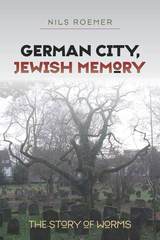
German City, Jewish Memory
The Story of Worms
Nils Roemer
Brandeis University Press, 2010
German and Jewish ways of life have been interwoven in Worms, Germany, for over a thousand years. Despite radical changes brought about by expulsion of Jews, wartime devastation, social advancement, cultural and religious renewal, and the Jewish community’s destruction during the Holocaust, the Jewish sites of Worms display a remarkable degree of continuity, which has contributed to the development of distinct urban Jewish cultures, memories, and identities. Tracing the recollection and invention of local Jewish historical traditions in religious commemorations, historical writings, museums, and historical monuments, and the transformation from “sites” to “sights” in the form of tourism from the Middle Ages to the present, Roemer’s rich study of Worms offers a blueprint for historians interested in developing similar studies of cities over the longue durée.
[more]
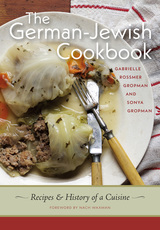
The German-Jewish Cookbook
Recipes and History of a Cuisine
Gabrielle Rossmer Gropman and Sonya Gropman
Brandeis University Press, 2017
This cookbook features recipes for German-Jewish cuisine as it existed in Germany prior to World War II, and as refugees later adapted it in the United States and elsewhere. Because these dishes differ from more familiar Jewish food, they will be a discovery for many people. With a focus on fresh, seasonal ingredients, this indispensable collection of recipes includes numerous soups, both chilled and hot; vegetable dishes; meats, poultry, and fish; fruit desserts; cakes; and the German version of challah, Berches. These elegant and mostly easy-to-make recipes range from light summery fare to hearty winter foods. The Gropmans—a mother-daughter author pair—have honored the original recipes Gabrielle learned after arriving as a baby in Washington Heights from Germany in 1939, while updating their format to reflect contemporary standards of recipe writing. Six recipe chapters offer easy-to-follow instructions for weekday meals, Shabbos and holiday meals, sausage and cold cuts, vegetables, coffee and cake, and core recipes basic to the preparation of German-Jewish cuisine. Some of these recipes come from friends and family of the authors; others have been culled from interviews conducted by the authors, prewar German-Jewish cookbooks, nineteenth-century American cookbooks, community cookbooks, memoirs, or historical and archival material. The introduction explains the basics of Jewish diet (kosher law). The historical chapter that follows sets the stage by describing Jewish social customs in Germany and then offering a look at life in the vibrant émigré community of Washington Heights in New York City in the 1940s and 1950s. Vividly illustrated with more than fifty drawings by Megan Piontkowski and photographs by Sonya Gropman that show the cooking process as well as the delicious finished dishes, this cookbook will appeal to readers curious about ethnic cooking and how it has evolved, and to anyone interested in exploring delicious new recipes.
[more]

Gershom Scholem
From Berlin to Jerusalem and Back
Noam Zadoff
Brandeis University Press, 2017
German-born Gerhard (Gershom) Scholem (1897–1982), the preeminent scholar of Jewish mysticism, delved into the historical analysis of kabbalistic literature from late antiquity to the twentieth century. His writings traverse Jewish historiography, Zionism, the phenomenology of mystical religion, and the spiritual and political condition of contemporary Judaism and Jewish civilization. Scholem famously recounted rejecting his parents’ assimilationist liberalism in favor of Zionism and immigrating to Palestine in 1923, where he became a central figure in the German Jewish immigrant community that dominated the nation’s intellectual landscape in Mandatory Palestine. Despite Scholem’s public renunciation of Germany for Israel, Zadoff explores how the life and work of Scholem reflect ambivalence toward Zionism and his German origins.
[more]
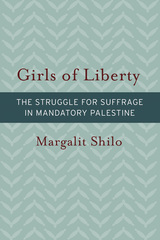
Girls of Liberty
The Struggle for Suffrage in Mandatory Palestine
Margalit Shilo
Brandeis University Press, 2016
Following the Balfour Declaration and the British conquest of Palestine (1917–1918), the small Jewish community that lived there wanted to establish an elected assembly as its representative body. The issue that hindered this aim was whether women would be part of it. A group of feminist Zionist women from all over the country created a political party that participated in the elections, even before women’s suffrage was enacted. This unique phenomenon in Mandatory Palestine resulted in the declaration of women’s equal rights in all aspects of life by the newly founded Assembly of Representatives. Margalit Shilo examines the story of these activists to elaborate on a wide range of issues, including the Zionist roots of feminism and nationalism; the ultra-Orthodox Jewish sector’s negation of women’s equality; how traditional Jewish concepts of women fashioned rabbinical attitudes on the question of women’s suffrage; and how the fight for women’s suffrage spread throughout the country. Using current gender theories, Shilo compares the Zionist suffrage struggle to contemporaneous struggles across the globe, and connects this nearly forgotten episode, absent from Israeli historiography, with the present situation of Israeli women. This rich analysis of women’s right to vote within this specific setting will appeal to scholars and students of Israel studies, and to feminist and social historians interested in how contexts change the ways in which activism is perceived and occurs.
[more]

Glikl
Memoirs 1691-1719
Annotated by and with an Introduction by Chava Turniansky
Brandeis University Press, 2019
“My dear children, I write this for you in case your dear children or grandchildren come to you one of these days, knowing nothing of their family. For this reason I have set this down for you here in brief, so that you might know what kind of people you come from.”
These words from the memoirs Glikl bas Leib wrote in Yiddish between 1691 and 1719 shed light on the life of a devout and worldly woman. Writing initially to seek solace in the long nights of her widowhood, Glikl continued to record the joys and tribulations of her family and community in an account unique for its impressive literary talents and strong invocation of self. Through intensely personal recollections, Glikl weaves stories and traditional tales that express her thoughts and beliefs. While influenced by popular Yiddish moral literature, Glikl’s frequent use of first person and the significance she assigns her own life experience set the work apart. Informed by fidelity to the original Yiddish text, this authoritative new translation is fully annotated to explicate Glikl’s life and times, offering readers a rich context for appreciating this classic work.
These words from the memoirs Glikl bas Leib wrote in Yiddish between 1691 and 1719 shed light on the life of a devout and worldly woman. Writing initially to seek solace in the long nights of her widowhood, Glikl continued to record the joys and tribulations of her family and community in an account unique for its impressive literary talents and strong invocation of self. Through intensely personal recollections, Glikl weaves stories and traditional tales that express her thoughts and beliefs. While influenced by popular Yiddish moral literature, Glikl’s frequent use of first person and the significance she assigns her own life experience set the work apart. Informed by fidelity to the original Yiddish text, this authoritative new translation is fully annotated to explicate Glikl’s life and times, offering readers a rich context for appreciating this classic work.
[more]
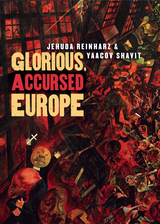
Glorious, Accursed Europe
Jehuda Reinharz and Yaacov Shavit
Brandeis University Press, 2010
This volume offers a fascinating look at the complex relationship between Jews and Europe during the past two hundred years, and how the European Jewish and non-Jewish intelligentsia interpreted the modern Jewish experience, primarily in Germany, Russia, and Central and Eastern Europe. Beginning with premodern European attitudes toward Jews, Reinharz and Shavit move quickly to “the glorious nineteenth century,” a period in which Jewish dreams of true assimilation came up against modern antisemitism. Later chapters explore the fin-de-siècle “crisis of modernity”; the myth of the modern European Jew; expectations and fears in the interwar period; differences between European nations in their attitude toward Jews; the views of Zionists and early settlers of Palestine and Israel toward the Europe left behind; and views of contemporary Israeli intellectuals toward Europe, including its new Muslim population—the latest incarnation of the Jewish Question in Europe.
[more]
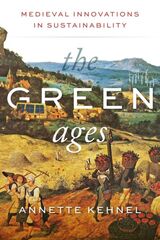
The Green Ages
Medieval Innovations in Sustainability
Annette Kehnel
Brandeis University Press, 2024
A fascinating blend of history and ecological economics that uncovers the medieval precedents for modern concepts of sustainable living.
In The Green Ages, historian Annette Kehnel explores sustainability initiatives from the Middle Ages, highlighting communities that operated a barter trade system on the Monte Subiaco in Italy, sustainable fishing at Lake Constance, common lands in the United Kingdom, transient grazing among Alpine shepherds in the south of France, and bridges built by crowdfunding in Avignon. Kehnel takes these medieval examples and applies their practical lessons to the modern world to prove that we can live sustainably—we’ve done it before!
From the garden economy in the mythical-sounding City of Ladies to early microcredit banks, Kehnel uncovers a world at odds with our understanding of the typical medieval existence. Premodern history is full of inspiring examples and concepts ripe for rediscovery, and we urgently need them as today’s challenges—finite resources, the twilight of consumerism, and growing inequality—threaten what we have come to think of as a modern way of living sustainably. This is a stimulating and revelatory look at a past that has the power to change our future.
In The Green Ages, historian Annette Kehnel explores sustainability initiatives from the Middle Ages, highlighting communities that operated a barter trade system on the Monte Subiaco in Italy, sustainable fishing at Lake Constance, common lands in the United Kingdom, transient grazing among Alpine shepherds in the south of France, and bridges built by crowdfunding in Avignon. Kehnel takes these medieval examples and applies their practical lessons to the modern world to prove that we can live sustainably—we’ve done it before!
From the garden economy in the mythical-sounding City of Ladies to early microcredit banks, Kehnel uncovers a world at odds with our understanding of the typical medieval existence. Premodern history is full of inspiring examples and concepts ripe for rediscovery, and we urgently need them as today’s challenges—finite resources, the twilight of consumerism, and growing inequality—threaten what we have come to think of as a modern way of living sustainably. This is a stimulating and revelatory look at a past that has the power to change our future.
[more]
READERS
Browse our collection.
PUBLISHERS
See BiblioVault's publisher services.
STUDENT SERVICES
Files for college accessibility offices.
UChicago Accessibility Resources
home | accessibility | search | about | contact us
BiblioVault ® 2001 - 2024
The University of Chicago Press





